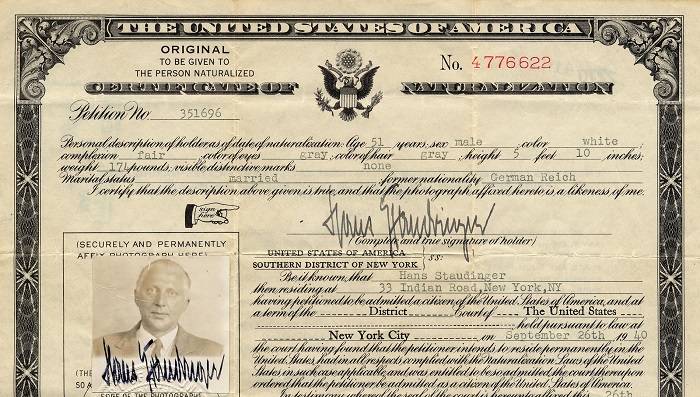General correspondence reflects Ehrmann's professional and private relationships with friends, colleagues, fellow scholars, publishers, editors, and various educational and professional organizations in the United States, France, and Germany. The sub-series contains correspondence with such institutions as the US Senate (including John F. Kennedy's letter to the Ehrmann's), Department of State, and many universities in the USA and abroad. There are also letters from Robert Oppenheimer, Eugen Rosenstock-Huessy, Eleanor Roosevelt, and correspondence that originated in reaction to Ehrmann's letter on Martin Luther King (published in The New York Times in 1969).
Collections : [German and Jewish Intellectual Émigré Collections]
German and Jewish Intellectual Émigré Collections
Personal and professional papers of German-speaking Émigré in the social sciences, humanities, and the arts and the organizations which assisted those who fled the Nazi regime.
Search Constraints
Start Over You searched for: Collecting Area German and Jewish Intellectual Émigré Collections Remove constraint Collecting Area: German and Jewish Intellectual Émigré Collections Level Subseries Remove constraint Level: Subseries Date range 1980 to 1989 Remove constraint Date range: <span class="from" data-blrl-begin="1980">1980</span> to <span class="to" data-blrl-end="1989">1989</span>Search Results
Includes correspondence (2558 letters), as well as related photographs (106 photos), offprints and clippings, of Roy C. Bates (and after his death in 1974 continued by Barbara Bates) with friends and family members. Most notable among the personal correspondents are: Helmut circa Bates (son), wife, Dorit, and children Kenny and Denny; Tyll Bates (son) and wife, Francy; Wilhelm (Willy) and Imma von Bodmershof (née Ehrenfels), which includes correspondence during the early 1950s documenting Bodmershof's efforts to help Bates publish his poetry; Dr. Henry and Doris Brann; Dr. Ilse Bry; Baron Umar Rolf and Mireille Abeille von Ehrenfels, the most extensive correspondence in the collection, dating from 1939-1974 between Ehrenfels and Bates, and continuing between Barbara Bates and Mireille Abeille (1974-1987), documenting their combined efforts to publish Bates' work posthumously; Eva and Hans Friede; Erika Mann (and family members, Golo, Katja, and Klaus), 1940-1962, including legal correspondence over copyright issues in the filming of Thomas Mann's Der Zauberberg; Ilse and Bernhard Reichenbach.
This sub-series contains correspondences with numerous relatives, including numerous members of the Friedländer, Bergmann, Haase and Lichtenstein families, most forced to flee Nazi Germany because of their Jewish heritage, eventually settling in the United States, England, Israel and Australia. Among the correspondence with friends included in this series, are lengthy correspondences spanning four or five decades with Irma and Erich Berndt, Paul and Käte Brün, Alfred and Charlotte Dresel, Leo and Anne Marie Grebler, Isa Gruner, Werner and Hanna Heider, Mario and Dorothee Iona, Paul and Regina Kägi, Robert M.W. and Benedicta Kempner, Robert and Herthi Liebknecht, Dyno and Mara Löwenstein, Adolf and Elisabeth Lüchinger, Hilde and Hardi Meisels, Hans and Käte Siegel.
This section contains the main body of Paetel's correspondence with fellow writers and former youth movement leaders, and includes letters to and from: Stefan Andres, Max Barth, Artur von Behr, Ludwig Blanck-Conrady, Hans Friedrich Blunck, Rudolf Daur, Jean-Pierre des Coudres, Joseph E. Drexel, Charlotte Ehrke, Manfred George, Heinz Gollong, Artur Grosse, Heinz Gruber, Walter Hammer, Pablo Hesslein, Hans Jaeger, Ernst Jnger, Erich von Kahler, Joseph Kaskell, Kurt Kersten, Werner Kindt, Werner Kleinow, Richard Lagrange, Werner Lass, Ernst Niekisch, Heinz Orth, Udo Rukser, Hermann W. Schmid, Albert Theile, Paul Tillich, Max Wehling, Johannes Welke, and Karl August Wittfogel.
Subseries 1: Correspondence, 1943-1981 0.05 cubic ft.
This subseries contains correspondence with Thomas Blakemore, Kurt Steiner, Justin Williams, and other people Oppler worked with while in Japan. Other letters concern various interviews with scholars and journalists and various political causes that Oppler supported. Of note is a letter from Chairman of the Joint Chiefs of Staff Lyman L. Leminitzer (September 22, 1960). Oppler segregated almost all correspondence generated while working with the SCAP and the FEC and while writing Legal Reform in Occupied Japan and entries for The Encyclopedia of Japan and kept it with other papers pertaining to these activities. This arrangement has been preserved.
Subseries 1: Articles, Reviews, and Books, 1932-ca. 1990 0.60 cubic ft.
This sub-series contains some of Lowe's published and unpublished studies of economics, sociology, and current affairs. Highlights include a lengthy essay written in the form of a letter to his close friend Hans Jonas, unpublished materials that he apparently drafted while writing Has Freedom a Future?, and a complete typescript of the book itself.
Subseries 2: Articles and Speeches, 1961-1982 0.20 cubic ft.
This subseries contains articles and speech notes Oppler wrote after retiring. Of particular interest are his analysis of the Sunakawa Case, in which the Japanese Supreme Court ruled that Japan's constitutional ban on rearmament did not prohibit the stationing of U.S. troops on Japanese soil, and notes for a speech that he gave a week before his death.
Subseries 2: Lectures, 1932-1983 0.30 cubic ft.
This sub-series consists of notes for lectures that Lowe delivered at various academic institutions and before various community groups. Some of these speeches were given before the New School's Study Group on Germany (1942-43) and its General Seminar, an interdisciplinary forum at which faculty members discussed their work.
